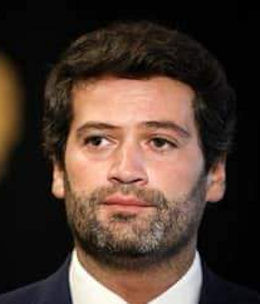Chega! [Enough!]
 Despite the far-right’s march across the Western world, some countries like Portugal and Germany thought that they might be exceptions to the phenomenal rise of populist movements. But approaching elections in Portugal, a Catholic-majority country with a 10 million population, have shown that Lisbon might be the next trouble spot of the far-right, as the country’s populist party, Chega! [pt = Enough!], has significantly increased its appeal across the southwestern European state.
Despite the far-right’s march across the Western world, some countries like Portugal and Germany thought that they might be exceptions to the phenomenal rise of populist movements. But approaching elections in Portugal, a Catholic-majority country with a 10 million population, have shown that Lisbon might be the next trouble spot of the far-right, as the country’s populist party, Chega! [pt = Enough!], has significantly increased its appeal across the southwestern European state.
Prior to the establishment of Chega!, which means Enough, in 2019, the party’s leader, Andre Ventura, had been a sports pundit at the country’s popular football club Benfica’s TV station, but also has an academic background. Following the 2019 general elections, Ventura was able to enter the Portugal parliament as the only MP of Chega!, receiving 1.4 percent of the vote. But he has risen spectacularly since garnering nearly 12 percent of the vote in the country’s presidential elections in 2021, coming third.
The reasons behind Chega’s big increase in support are three-fold. “Getting parliamentary representation was a very important factor when it came to legitimising the discourse of their party leader, André Ventura. Second, whereas the mainstream media had shied away from far-right views in the past, they subsequently U-turned to give Chega a disproportionate amount of coverage. The third reason is that Riu Rio, the PDS leader, has not said that his party would exclude Chega from supporting a minority government. So the right-wing electorate was not obliged to vote strategically. And this raised the numbers of those intending to vote for Chega.
Different polls indicate that in the upcoming elections on 30 January 2022, his party will possibly get ten times more votes than the 2019 polls, placing his party in a kingmaker position for the formation of the next government. Angered by early elections, the Portuguese electorate might punish leftists parties. As a result, Ventura’s populist party could get more votes than the two small radical left parties, placing itself third in the elections. If that happens, then, Chega! might be the potential coalition partner of the country’s center-right Social Democratic Party (PSD).
“One aspect of Portugal’s far-right at the moment is that we don’t really know how the party will look like once they have several MPs (possibly about ten in the next parliament),” said Nuno Garoupa, a Portuguese academic and a Professor of Law at George Mason University. “One thing is a party largely built around one specific charismatic person (Ventura), a different thing is a party with 10MPs and possibly the third largest in the Parliament. That’s a big unknown at the moment,”
“It’s going to happen, if not after this election then after the next one,” said Francisco Pereira Coutinho, a constitutional law professor at Lisbon’s Nova University, from which Ventura graduated in law with a grade of 19 out of 20. “It’s going to be impossible to have a majority on the right without the populists,” Coutinho argued.
Since 2019, as the Chega! leader, Ventura, not only stigmatised minorities but also became a populist leader, allying himself with people like France’s Marine Le Pen, leader of the country’s far-right party, Rassemblement National, and neighbouring Spain’s far-right Vox party leader, Santiago Abascal. Paradoxically, the same guy, who received a good education from different institutions becoming a law professor and jurist, provided a strong criticism in his PhD thesis toward “criminal populism”, expressing his fears of "stigmatisation of minorities" and "expansion of police powers".
When asked about the clear contradictions regarding his past and current stances, Ventura controversially said that he "always made a distinction between science and opinion", referring to his PhD conduct as "scientific analysis, not ideological postulate". But Garoupa found Ventura’s “distinction” quite "a ridiculous argument and an incomprehensible position", describing his explanation "like saying that the Earth is round scientifically but politically it is flat.”
The publication of his latest book, which is a novel about the death of Palestinian Liberation Organisation’s leader Yasser Arafat, was suspended due to its "incendiary potential" for problematic references to Prophet Mohammed and Palestinian leaders.
At the grassroots voter level in Portugal, the far right’s rise in popularity and apparent predilection for elements of Salazar’s Estado Novo [New State] authoritarian regime produces very mixed reactions. “We have a generation of voters that do not really know what happened in their grandparents’ time,” said Alexandre Pinto, a language teacher in Lisbon who is worried about Chega’s increased support. “Ventura is backed by a politician like Diogo Pacheco de Amorim” – broadly considered to be Chega’s chief political thinker – “who’s been a part of the country’s far right since 1974”, he said.
|
NEWSLETTER
|
| Join the GlobalSecurity.org mailing list |
|
|
|

